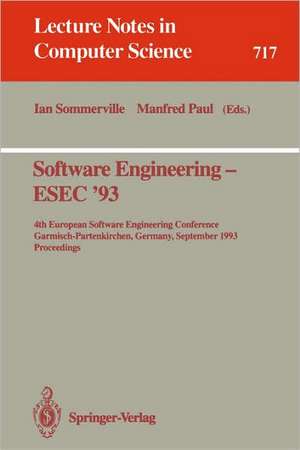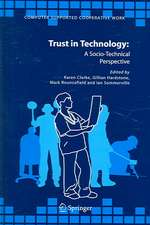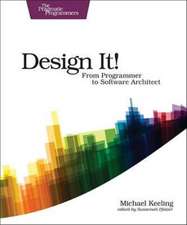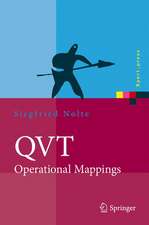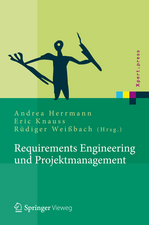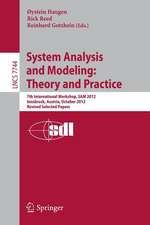Software Engineering - ESEC '93: 4th European Software Engineering Conference, Garmisch-Partenkirchen, Germany, September 13-17, 1993. Proceedings: Lecture Notes in Computer Science, cartea 717
Editat de Ian Sommerville, Manfred Paulen Limba Engleză Paperback – 30 aug 1993
Din seria Lecture Notes in Computer Science
- 20%
 Preț: 1061.55 lei
Preț: 1061.55 lei - 20%
 Preț: 307.71 lei
Preț: 307.71 lei - 20%
 Preț: 438.69 lei
Preț: 438.69 lei - 20%
 Preț: 579.30 lei
Preț: 579.30 lei -
 Preț: 410.88 lei
Preț: 410.88 lei - 17%
 Preț: 427.22 lei
Preț: 427.22 lei - 20%
 Preț: 596.46 lei
Preț: 596.46 lei - 15%
 Preț: 448.04 lei
Preț: 448.04 lei - 20%
 Preț: 353.50 lei
Preț: 353.50 lei -
 Preț: 389.49 lei
Preț: 389.49 lei - 20%
 Preț: 309.90 lei
Preț: 309.90 lei - 20%
 Preț: 645.28 lei
Preț: 645.28 lei - 20%
 Preț: 763.23 lei
Preț: 763.23 lei - 15%
 Preț: 580.46 lei
Preț: 580.46 lei - 20%
 Preț: 310.28 lei
Preț: 310.28 lei - 20%
 Preț: 655.02 lei
Preț: 655.02 lei - 20%
 Preț: 1183.14 lei
Preț: 1183.14 lei - 20%
 Preț: 340.32 lei
Preț: 340.32 lei -
 Preț: 449.57 lei
Preț: 449.57 lei - 20%
 Preț: 591.51 lei
Preț: 591.51 lei - 18%
 Preț: 938.83 lei
Preț: 938.83 lei - 20%
 Preț: 337.00 lei
Preț: 337.00 lei - 20%
 Preț: 649.50 lei
Preț: 649.50 lei - 20%
 Preț: 607.40 lei
Preț: 607.40 lei - 20%
 Preț: 1414.79 lei
Preț: 1414.79 lei - 20%
 Preț: 1024.44 lei
Preț: 1024.44 lei - 20%
 Preț: 583.40 lei
Preț: 583.40 lei - 20%
 Preț: 453.32 lei
Preț: 453.32 lei - 20%
 Preț: 575.49 lei
Preț: 575.49 lei - 20%
 Preț: 1075.26 lei
Preț: 1075.26 lei - 20%
 Preț: 585.88 lei
Preț: 585.88 lei - 20%
 Preț: 825.93 lei
Preț: 825.93 lei - 17%
 Preț: 360.20 lei
Preț: 360.20 lei - 20%
 Preț: 763.23 lei
Preț: 763.23 lei - 20%
 Preț: 340.32 lei
Preț: 340.32 lei - 20%
 Preț: 504.58 lei
Preț: 504.58 lei - 20%
 Preț: 369.13 lei
Preț: 369.13 lei - 20%
 Preț: 580.93 lei
Preț: 580.93 lei - 20%
 Preț: 343.62 lei
Preț: 343.62 lei - 20%
 Preț: 350.21 lei
Preț: 350.21 lei - 20%
 Preț: 583.40 lei
Preț: 583.40 lei - 20%
 Preț: 583.40 lei
Preț: 583.40 lei - 15%
 Preț: 438.59 lei
Preț: 438.59 lei - 20%
 Preț: 341.95 lei
Preț: 341.95 lei - 20%
 Preț: 238.01 lei
Preț: 238.01 lei - 20%
 Preț: 538.30 lei
Preț: 538.30 lei
Preț: 344.42 lei
Preț vechi: 430.53 lei
-20% Nou
Puncte Express: 517
Preț estimativ în valută:
65.90€ • 71.81$ • 55.53£
65.90€ • 71.81$ • 55.53£
Carte tipărită la comandă
Livrare economică 23 aprilie-07 mai
Preluare comenzi: 021 569.72.76
Specificații
ISBN-13: 9783540572091
ISBN-10: 3540572090
Pagini: 536
Ilustrații: XII, 520 p.
Dimensiuni: 216 x 279 x 28 mm
Greutate: 0.75 kg
Ediția:1993
Editura: Springer Berlin, Heidelberg
Colecția Springer
Seria Lecture Notes in Computer Science
Locul publicării:Berlin, Heidelberg, Germany
ISBN-10: 3540572090
Pagini: 536
Ilustrații: XII, 520 p.
Dimensiuni: 216 x 279 x 28 mm
Greutate: 0.75 kg
Ediția:1993
Editura: Springer Berlin, Heidelberg
Colecția Springer
Seria Lecture Notes in Computer Science
Locul publicării:Berlin, Heidelberg, Germany
Public țintă
ResearchCuprins
On the decline of classical programming.- Computers are not omnipotent.- Real-time systems: A survey of approaches to formal specification and verification.- Software engineering in business and academia: How wide is the gap?.- Software faults in evolving a large, real-time system: a case study.- The Experience Factory and its relationship to other Improvement Paradigms.- Inconsistency handling in multi-perspective specifications.- Requirements engineering: An integrated view of representation, process, and domain.- Making changes to formal specifications: Requirements and an example.- Formal requirements made practical.- Databases for software engineering environments.- A regression testing database model.- Experiences with a federated environment testbed.- Observations on object management systems and process support in environments.- Software technology for a distributed telecommunication system.- Industrial software development — a case study.- Quantitative approach to software management: the ami method.- Preventative software engineering.- Distributed information systems: An advanced methodology.- Tractable flow analysis for anomaly detection in distributed programs.- A pragmatic task design approach based on a Ward/Mellor real-time structured specification.- Integration of structured analysis and timed statecharts for real-time and concurrency specification.- Language constructs for cooperative systems design.- Scrutiny: A collaborative inspection and review system.- COO: A transaction model to support cooperating software developers Coordination.- An experiment in software retrieval.- Using formal methods to construct a software component library.- Capsule oriented reverse engineering for software reuse.- Automatic replanning of task networks for process modelevolution in EPOS.- Provence: A process visualization and enactment environment.- Process programming with active and passive components.- A formal framework for ASTRAL intra-level proof obligations.- Assertion-based debugging of imperative programs by abstract interpretation.
